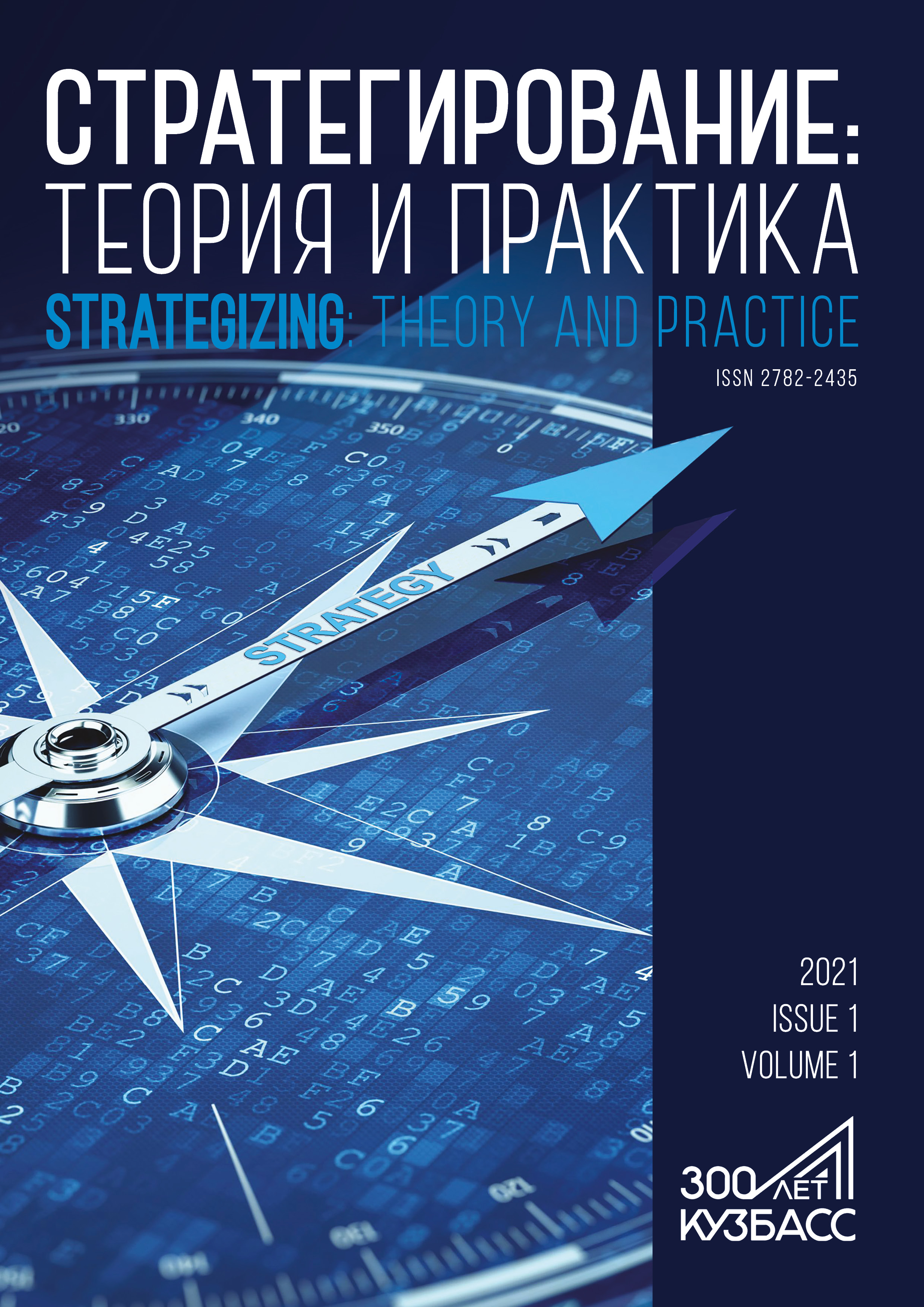Moscow, Russian Federation
The current crisis and the accelerated economic development both require new methods and technologies in order to plan the development of socio-economic and business entities. Digital transformation proved extremely effective in improving economic performance. Digital transformation requires an executable strategy that can help the economy to reach the target state by distributing available resources in priority areas. The economic system is ready for digital transformation if it possesses an appropriate external environment. The article introduces an authentic approach to the analysis of the processes at the core of the regional economy. The research featured the case of the socio-economic system of the Kemerovo region. It included a comprehensive assessment of the region’s viability in creating a favorable business environment at the early stage of digital transformation. To prevent economic stagnation, the leading regional enterprises should introduce capital-intensive technologies and conduct digital business transformation. Such poles of growth can open access to digital technologies for small and medium-sized businesses, thereby ensuring the sustainability and competitiveness of the region. New IT ecosystems are the key to successful digital transformation as they implement a systematic approach to decision-making, as well as such technologies of knowledge-driven economy as predictive analytics, artificial intelligence, big data, cloud computing, etc. The paper also contains recommendations for the development of a consolidated information area on a digital enterprise.
information system, planning, forecasting, regional economy, development strategy, change management, digital platform, digital transformation, digital twin
1. Aganbegyan AG. Analysis and forecasting of socio-economic development of regions (methodical notes). Central Russian Journal of Social Sciences. 2019;14(4):15-28. (In Russ.) https://doi.org/10.22394/2071-2367-2019-14-4-15-28
2. Arkhipova MYu, Sirotin VP. Development of digital technologies in Russia: Regional aspects. Economy of Region. 2019;15(3):670-683. (In Russ.) https://doi.org/10.17059/2019-3-4
3. Balatsky EV, Ekimova NA. Innovation-technology matrices and national economic development strategies. The Manager. 2019;10(5):9-19. (In Russ.) https://doi.org/10.29141/2218-5003-2019-10-5-2
4. Borshch LM, Gerasimova SV. Spatial model of innovative technological regional development. St. Petersburg State Polytechnical University Journal. Economics. 2018;11(4):185-199. https://doi.org/10.18721/JE.11414.
5. Vorontsovskiy AV. Digitalization of the economy and its impact on economic development and social welfare. St Petersburg University Journal of Economic Studies. 2020;36(2):189-216. (In Russ.) https://doi.org/10.21638/spbu05.2020.202
6. Zhuravlev DM. Development of a model of the regional economic system of the subject of the Russian Federation. MIR (Modernization. Innovation. Research). 2020;11(1):29-43. (In Russ.) https://doi.org/10.18184/2079-4665.2020.11.1.29-43.
7. Kvint VL. The concept of strategizing. Kemerovo: Kemerovo State University; 2020. 170 p. (In Russ.) https://doi.org/10.21603/978-5-8353-2562-7.
8. Kramin TV, Klimanova AR. Development of digital infrastructure in the Russian regions. Terra Economicus. 2019;17(2):60-76. (In Russ.) https://doi.org/10.23683/2073-6606-2019-17-2-60-76
9. Matveeva LG, Nikitaeva AYu, Chernova OA. Information as a strategic resource for regional development: Institutional and technological aspects. Terra Economicus. 2018;16(1):134-145. (In Russ.) https://doi.org/10.23683/2073-6606-2018-16-1-134-145
10. Mau VA. At the final stage of the global crisis: Economic tasks in 2017-2019. Voprosy Ekonomiki. 2018;(3):5-29. (In Russ.) https://doi.org/10.32609/0042-8736-2018-3-5-29
11. Akberdina VV, Grebenkin AV, Korovin GB, Ponomareva AI. Modelling of industrial policy on the basis of game-theoretic models of interaction between government and business. Russian Journal of Economic Theory. 2018;15(4):554-560. (In Russ.)
12. Novikova IV. The concept of employment strategy for the digital economy. Kemerovo: Kemerovo State University; 2020. 254 p. (In Russ.) https://doi.org/10.21603/978-5-8353-2609-9
13. Osipov YuM, Yudina TN, Geliskhanov IG. Information-digital economy: Concept, basic parameters and implementation mechanisms. Moscow University Economics Bulletin. 2019;(3):41-60. (In Russ.)
14. Pinchuk VN, Zhuravlev DM. Company. Technologies and economics of digital transformation. Novosibirsk: Akademizdat; 2020. 230 p. (In Russ.)
15. Rumyantsev NM, Leonidova EG. Asymmetry problems of structural shifts in regional economy. Economic and Social Changes: Facts, Trends, Forecast. 2020;13(6):169-183. (In Russ.) https://doi.org/10.15838/esc.2020.6.72.10.
16. Smorodinskaya NV, Katukov DD. When and why regional clusters become basic building blocks of modern economy. Baltic Region. 2019;11(3):61-91. (In Russ.) https://doi.org/10.5922/2079-8555-2019-3-4
17. Tatarkin AI. Regional targeting of the economic policy of the Russian federation as an institution of regional spatial development. Economy of Region. 2016;12(1):9-27. (In Russ.) https://doi.org/10.17059/2016-1-1
18. Urasova AA, Mukhin MA, Kochina KF. Topical approaches to managing socio-economic development of territories. The Manager. 2018;9(1):14-23. (In Russ.)
19. Mitrofanova IV, Bisakaeva MA, Gukasova NR, Orlyanskaya AA. Digital transformation of peripheral regions of the South of Russia (on the example of the Chechen republic). Economics: Yesterday, Today and Tomorrow. 2018;8(10A):117-131. (In Russ.)
20. Chaadaev VK. “Smart housing and communal services” as cost reduction in the management of apartment buildings. Economy and management of the national economy: genesis, current state, and development prospects: Proceedings of the II International scientific and practical conference; 2018; Voronezh. Voronezh: Voronezh institute of economical and legal; 2018. p. 211-215. (In Russ.)
21. Fagerberg J. Technological progress, structural change and productivity growth: a comparative study. Structural Change and Economic Dynamics. 2000;11(4):393-411. https://doi.org/10.1016/S0954-349X(00)00025-4
22. Korovin GB. Architecture of the agent-based model for the region’s industrial complex digital transformation. Journal of New Economy. 2020;21(3):158-174. https://doi.org/10.29141/2658-5081-2020-21-3-8
23. Kucera D, Jiang X. Structural transformation in emerging economies: leading sectors and the balanced growth hypothesis. Oxford Development Studies. 2019;47(2):188-204. https://doi.org/10.1080/13600818.2018.1533934
24. Beer A, Ayres S, Clower T, Faller F, Sancino A, Sotarauta M. Place leadership and regional economic development: a framework for cross-regional analysis. Regional Studies. 2019;53(2):171-182. https://doi.org/10.1080/00343404.2018.1447662
25. Pradhan RP, Mallik G, Bagchi TP. Information communication technology (ICT) infrastructure and economic growth: A causality evinced by cross-country panel data. IIMB Management Review. 2018;30(1):91-103. https://doi.org/10.1016/j.iimb.2018.01.001
26. Samaniego RM, Sun JY. Productivity growth and structural transformation. Review of Economic Dynamics. 2016;21:266-285. https://doi.org/10.1016/j.red.2015.06.003
27. Schwab K. The fourth industrial revolution. London: Penguin; 2017. 192 p





